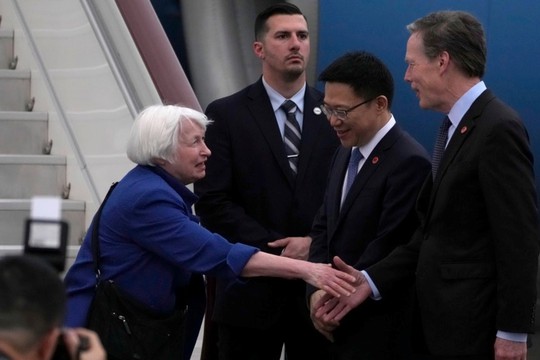The US Treasury Secretary Janet Yellen arrived in Guangzhou on the first leg of a six-day visit to China, April 4, 2024
Photo: AP
The salience of the phone call from the US President Joe Biden to Chinese President Xi Jinping is their consensus that during the period since their summit meeting in Woodside, California, in November 2023, the US-China relationship “is beginning to stabilise”, writes M.K. Bhadrakumar, Indian Ambassador and prominent international observer.
Both sides agreed that their discussion was “candid and constructive.” The Chinese analysts estimate that there is a common will in Beijing and Washington “to prevent negative factors from influencing the general stability of bilateral ties.”
Xi proposed three “overarching principles” to navigate 2024 — “peace must be valued”; “stability must be prioritised”; and, commitments should be followed up with action.
In general, the phone call can be viewed in positive terms. Both Xi and Biden expressed the wish for stabilising bilateral relations, managing differences, expanding cooperation, and concurred that a stable and predictable China-US relationship is in their interests.
Washington announced after the phone call that Treasury Secretary Janet Yellen will be travelling to China on an extended visit through April 3-9. The US Treasury Department stated that she “will build on the intensive diplomacy she has engaged in to responsibly manage the bilateral economic relationship and advance American interests.”
Earlier, during a press call at the White House, a senior administration official stressed that the Biden Administration has not changed its approach to China, “which remains one focused on the framework of invest, align, and compete. Intense competition requires intense diplomacy to manage tensions, address misperceptions, and prevent unintended conflict. And this call is one way to do that.”
Yellen’s six-day visit will be followed by a trip to Beijing by Secretary of State Antony Blinken “in the coming weeks.” A call between the defence ministers is also expected “soon.” Indeed, a steady build-up is under way.
Biden initiated the call. Conceivably, Washington, faced with multiple problems at home and abroad, needs China more than the other way around. Bogged down in the conflicts in Gaza and Ukraine, it can ill afford a confrontation in the Taiwan Straits. Again, the US needs China’s cooperation in important areas such as fentanyl control, climate change, Artificial Intelligence, green-energy transition, etc. — and, most important, financial stability.
The US monetary policy is at an inflection point. Financial risks have risen and there is rising uncertainty in the global market. The anxiety shared by investors is evident in the surge in gold’s appeal as a safe haven asset.
The global financial system is buffeted by multiple factors, such as unsustainable levels of debt, geopolitical confrontation, and a new era of low growth, low global investment and de-globalisation.
The rise of gold prices reflects as much a panic toward the risks surrounding the global financial system as a lack of confidence in US dollar-denominated assets. The point is, the US’ irresponsible monetary policy has greatly affected the international demand for dollars and dollar-denominated assets.
The enormity of the crisis in the US economy cannot be shoved under the carpet much longer. The US national debt today, estimated at $34 trillion, is almost equal to the combined value of the economies of China, Germany, Japan, India and the UK.
China can become a safe haven for international capital. Its economy is on an upward trend and given the tools at its disposal to ensure financial stability, China’s foreign exchange market is expected to maintain a relatively stable performance at a time of increasing uncertainty in the global financial market.
But geopolitical issues come into play. The Taiwan question and Beijing’s friendly ties with Moscow top the list of contentious issues. Biden raised with Xi concerns over China’s “support for Russia’s defence industrial base and its impact on European and transatlantic security.”
The Chinese foreign ministry spokesman Wang Wenbin promptly pushed back that “Other countries should not smear and attack normal relations between China and Russia, should not undermine the legitimate rights of China and Chinese companies, and should not shift blame to China wantonly and provoke camp confrontation.”
Beijing wouldn’t have forgotten that the Obama administration showed its “gratitude” within a couple of years after the 2008 financial crisis by unveiling the “pivot to Asia” strategy to clip China’s wings and contain its rise — a mindset that still defines Biden administration’s flight path.
read more in our Telegram-channel https://t.me/The_International_Affairs

 10:21 07.04.2024 •
10:21 07.04.2024 •























